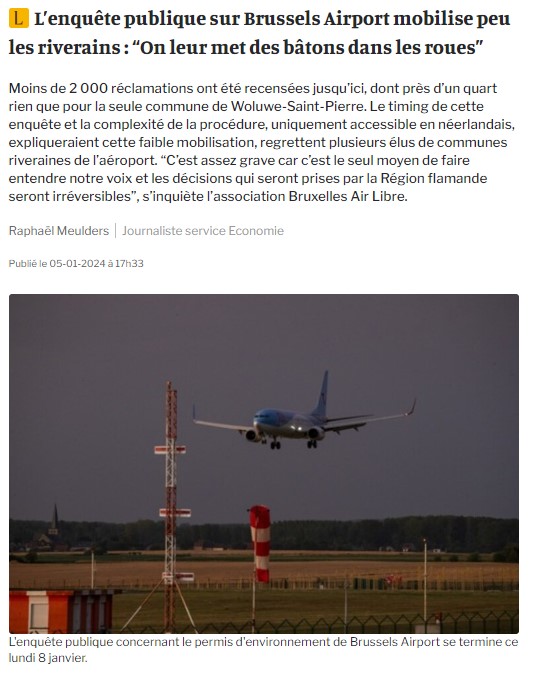La Libre Belgique ECO – 05-01-2024
Brussels Airport public inquiry draws little response from local residents: “We’re putting obstacles in their way”.
Fewer than 2,000 complaints have been recorded to date, with almost a quarter of these in Woluwe-Saint-Pierre alone. The timing of the survey and the complexity of the procedure, which can only be accessed in Dutch, may explain the low turnout, according to several elected representatives from towns near the airport. “It’s quite serious, because it’s the only way of making our voice heard, and the decisions taken by the Flemish Region will be irreversible”, worries the Bruxelles Air Libre association.
The deadline is midnight on Monday, January 8. So there are only a few hours left for anyone concerned to react to Brussels Airport’s application for an environmental permit. As a reminder, Brussels Airport urgently needs to obtain a new permit – the current one expires next July – in order to continue operating. The stakes are high, since this permit will be for an unlimited period, and will determine the number of flights the airport can carry out each year.
“It’s not much compared to the 100,000 Brussels residents bothered by aircraft noise”.
How many Belgians have expressed their grievances so far?”This public inquiry is ongoing, so there’s no question of providing figures”, explains the office of Flemish Environment Minister Zuhal Demir (N-VA), who is in charge of the dossier. Brussels Environment is more forthcoming. According to the Brussels-based organization, just over 1,900 complaints have currently been lodged on the Flemish Region’s platform, including 700 from the Brussels Region. “That’s relatively little compared to the 100,000 or so Brussels residents bothered by aircraft noise, the second biggest source of annoyance for Brussels residents after road noise”.explains spokeswoman Pascale Housman. However, Bruxelles-Environnement explains that it has communicated extensively on this public inquiry.
More than half of the complaints in Brussels come from the municipality of Woluwe Saint-Pierre alone (440 known complaints, 30 of which are in writing), which has mobilized its own municipal services, including the provision of standard forms. The procedure is particularly complex,” laments Mayor Benoît Cerexhe (Les Engagés).. You need to enter the Flemish counter, identify yourself via Itsme (a mobile identity application, editor’s note) or an identity card reader, and then dive into a 100% Dutch-speaking world. For those who don’t have a good knowledge of the Vondel language, it’s very complicated. We also have a fairly elderly population who haven’t mastered the new technologies, and we’ve helped them as best we can”. The mayor recalls the line taken by the Brussels communes: an end to night flights at the airport, a limit on the number of flights per year (220,000) and a ban on the noisiest aircraft.
“There would have been an avalanche of complaints if this survey had taken place in the summer”.
There are very few complaints on the Flemish side, where the airport is seen as an economic tool that cannot be attacked,” explains Philippe Touwaide, the federal ombudsman. He also feels that local residents have been “hindered” from speaking out. “The complaint process is very complex. The mandatory use of Itsme makes many people suspicious. There are also questions about the timing of this investigation, in the middle of the school vacations”. In the interests of “transparency“, Mr Touwaide explained that on Friday he himself submitted 205 written complaints to the mayor of Kortenberg, one of the four Flemish municipalities where complaints can be lodged, from local residents who were unable to send them via the Internet.
For Bertrand Waucquez (Kraainem Unie), mayor of Kraainem, the bad weather also explains this lack of interest from local residents. “In winter, you can hear the planes less. If we had done this survey last summer, when runway 25 was massively abused, we would have had an avalanche of complaints.”. The local councillor urges citizens not to miss this appointment. ” By Monday evening, it will be too late”. In his view, the communes affected must remain united in this process.” We must avoid this becoming a community conflict that divides and weakens local residents” , he concludes.

